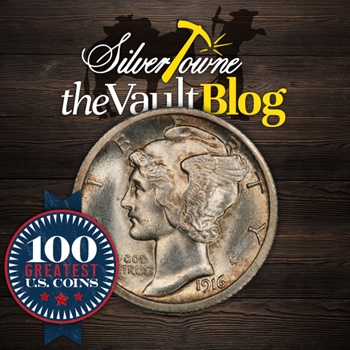
Around six years ago, the United States Mint celebrated the centennial anniversary of three very popular, very important coins in United States coinage history. One of those coins was the 1916 Mercury dime. While the popularity of the dime in itself holds strong, there is one that tends to outshine the other due to its mint mark. Along with author Jeff Garrett, we will take a closer look at this top 100 coin in Whitman Publishing’s 100 Greatest series.
#68 - 1916-D Mercury Dime
The Mercury dime was part of a decade-long redesign of United States coinage. In 1916 specifically, the dime, quarter and half dollar were chosen to receive a facelift. Adolph A. Weinman was chosen to take on the dime and half dollar. With the head of Liberty wearing a winged cap on the dime, the public decided that the image looked like the Roman messenger god, Mercury. This is where the newly minted dime got its name.
In 1916, the Philadelphia Mint would take on the majority of the production for the new dime. The San Francisco Mint would come in second as far as minting numbers followed by Denver. However, Denver would only proceed to produce 264,000 dimes which was just barely one hundredth of the dimes that were minted at Philadelphia. It would also end up being the lowest mintage of dimes produced throughout the entire series (1916-1945).
While the 1916-D Mercury dime is not considered to be super rare in terms of other coins compiled in this list, its popularity alone, according to Garrett, is worth the place it has taken among them. When trying to complete a run of Mercury dimes, the 1916-D is usually the most difficult to come by. With that said, it is one of the most counterfeited coins in United States history with thousands of Philadelphia minted dimes being altered to create the ‘D’ on the reverse. Because of this issue, it is recommended that when purchasing a 1916 Mercury dime from Denver, you buy one that is certified.
In 1960, a 1916-D Mercury dime was valued at $650 for a Choice Uncirculated condition. By this fourth edition publication (2015), it was valued at $20,000.







